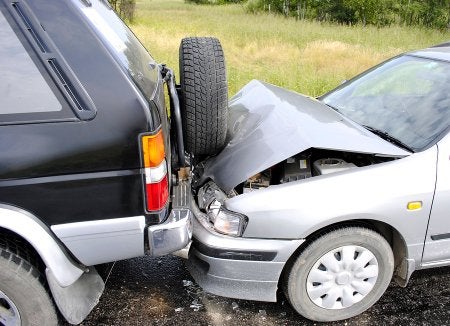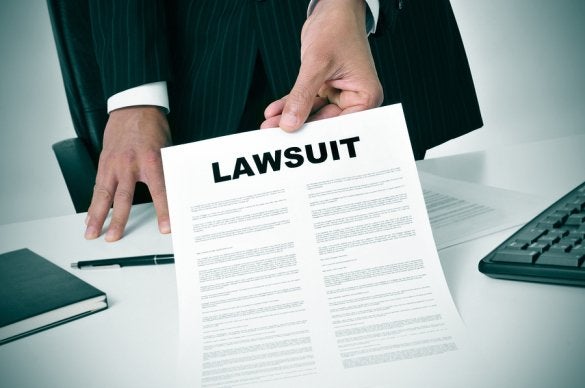-
Examining the Roles of Contributory & Comparative Negligence
Personal injury cases rest on the concept of negligence. When you hire a personal injury lawyer, he or she will consider the role of negligence in your case, including whether the negligence rests solely with the other party or if you contributed to the accident in any way. If you can be proven to have a role in causing the accident, your lawyer in Tracy may adjust the kind of compensation he or she pursues on your behalf. These concepts are known as contributory and comparative negligence, depending on the laws in your state. Here is what you need to know.

Contributory Negligence
Contributory negligence is a system used in only a handful of states: Maryland, Alabama, Virginia, North Carolina, and Washington, D.C. Under this system, accident victims who were responsible for any part of an accident can be prevented receiving any compensation at all for their injuries. Even if the role of victims was very small and their injuries are severe, the contributory negligence system means that they may be full responsible for all of their own damages, including long-term financial problems caused on ongoing medical bills or the inability to work. The all-or-nothing nature of contributory negligence is the reason it is only used in a small number of states. Other states have decided that contributory negligence is too extreme and instead rely on comparative negligence.
Comparative Negligence
The comparative negligence system lets defendants in personal injury cases mount a partial defense, in which they argue that the victim has some degree of responsibility for the accident, so they should only be eligible to receive a reduced amount of compensation. Usually, this is expressed as a percentage, and the assigned percentage of responsibility is the percentage of available compensation the victim receives. In some states, including California, there is a pure comparative negligence system, in which victims can receive compensation even if they were more negligent than the defendant. In modified comparative negligence states, accident victims must be less negligent than defendants to receive damages in a personal injury case.
-
Tips for Avoiding Inheritance Disputes
Inheritance disputes are an unfortunately common part of estate settlements. They are the last thing most people want to consider happening after they pass, and fortunately, you can minimize the chances of them happening in your family with the help of a will attorney in Tracy and Livermore . Working with a will lawyer will help you do everything from reducing the burden of inheritance tax on your heirs to keeping the potential for conflict under wraps. Here is what you need to know about considering the risk of disputes and accounting for them during your estate planning process.

Reduce the Risk of Surprises
Your will is a bad place to surprise your family. If you are planning to split up your inheritance in a way that is likely to catch your family off-guard, then consider discussing your decisions with them in advance. By having the discussion when you’re in the midst of estate planning, you can explain your reasons and allow your family to express their own feelings about your decisions. Even if they ultimately don’t like the decisions you are making, they are less likely to dispute them when your will is read, since they are prepared for what is coming and have likely had a chance to come to terms with your choices.
Pick an Executor Cautiously
The executor of your will can have a big impact on how smoothly your estate settlement goes. Although many people choose their oldest child, it doesn’t have to be him or her. Review your options with the help of your lawyer and choose an executor who is honest and capable of communicating effectively with all of your heirs.
Pay Attention to Sentimental Items
Sometimes the items that are most in dispute are sentimental things rather than money or property. Some people avoid conflicts over these things by distributing things while they are still alive. If you prefer to include things like family heirlooms in the will, consider attaching short explanations of the way you are splitting things in your will as well. Remember to be as specific as possible over who gets what, so that your wishes aren’t open to interpretation.
-
Comparing the Advantages of Wills and Trusts
If you aren’t sure whether you should set up a trust or if you have never made a will, it’s time to visit an estate planning lawyer in Tracy or Manteca. A seasoned lawyer can explain complex estate planning structures, review your unique situation, and offer effective legal guidance that protects your best interests . Remember to bring a list of your questions to your consultation with the will attorney.

Benefits and Uses of Wills
A last will and testament is a legal document that ensures that your wishes are carried out after your death. It is possible for a will not to be enforced if it was created improperly, which is why it’s always advisable to have a lawyer create this document for you. You may already know that wills can identify the beneficiaries who will receive your assets after your death. You may also select secondary beneficiaries to receive assets in the event that your primary beneficiaries did not survive you. One advantage of wills is their versatility. In addition to bequeathing your assets, you can use your will to identify a guardian for your minor or disabled children. You can even specify the person who should take custody of your pets. When you have a valid will, you can have the peace of mind that comes from knowing that your wishes will be honored even after you pass on.
Benefits and Uses of Trusts
Like a will, a trust is a legal document. However, it can be used to manage assets during life and after death. Most of the time, setting up a trust does not eliminate the need to create a valid will. Your trust might not include all of your assets. Plus, you’ll still need your will to designate a guardian for your minor children and name an executor for your estate. The primary benefits of setting up a trust include protecting your assets from creditors, minimizing estate and gift taxes, and, after you die, distributing assets to your beneficiaries in a way that bypasses the probate process.
-
The Dos and Don’ts of Auto Accident Claims
The process of filing an auto accident claim isn’t always as straightforward as it might appear. Unfortunately, it’s all too easy to make a simple mistake that can compromise your ability to obtain just compensation for your losses. It’s best to contact a personal injury lawyer near Tracy or Manteca as quickly as possible. Your personal injury lawyer will offer invaluable legal guidance and help you get the funds you need to get your life back on track.

Do Make Some Prompt Phone Calls
After a car crash, your first phone call should be to a 911 dispatcher. After the police clear you to leave the scene, you should go to the nearest medical center. Once you’ve been evaluated by a doctor, it’s time to call a personal injury lawyer. It’s advisable to speak with an injury lawyer before you contact the insurance company because your lawyer can guide you through the process of speaking with the claims representative without inadvertently saying something that might lead to negative consequences.
Don’t Forget Documentation
Even in simple accident cases, the insurance carrier may try to shift some of the blame to the victim to lower the amount of the settlement. Physical evidence and eyewitness testimony will help prove your case. Bring all relevant documents to your meeting with your personal injury attorney, such as a copy of the police report, your medical records, and car insurance policy. Your lawyer will need information about the other driver and a list of witnesses, such as passengers or passersby. It’s always a good idea to take photographs of the crash site, the damage to the vehicles, and any other relevant details. Your lawyer will use all of this evidence when he or she negotiates with the insurance carrier on your behalf.
Don’t Sign a Waiver
When you speak with the claims representative, it’s important that you avoid giving any recorded statements. Do not provide the insurance company with any written statements, or sign any waivers or releases until you speak with your attorney about these matters.
-
What Not to Say After a Car Crash
Personal injury lawyers in Tracy and Manteca can assist you in securing compensation after a car accident . Unfortunately, many car crash victims inadvertently compromise the influence of their personal injury lawyer by saying the wrong things to the other driver. Since your personal injury lawyer won’t be on the scene to guide you, it’s important to know the ins and outs of conversing with the other driver after a crash.

Although you’ll need to gather certain information from the other driver such as the driver’s license number and contact information, you should refrain from discussing anything else with him or her. In particular, injury lawyers strongly recommend not discussing the specifics of the crash, such as which party made which mistakes. Never apologize for the crash because this can be misinterpreted as an admission of fault. The insurance carrier will attempt to pin the blame on you, even if you truly weren’t at fault, and apologizing to the other driver will only serve to substantiate the case against you.
-
Preparing for Your Estate Planning Appointment
Estate planning is essential for every adult, regardless of the extent of their assets. When it’s time for you to visit an estate planning attorney in Tracy or Livermore, you should take some time to prepare. Arriving with the right documents and information allows you to get the most out of your estate planning appointment.
Watch this video to find out which documents and information you will need to bring to your appointment. You’ll also learn about some of the matters that your lawyer can assist you with beyond the creation of a last will and testament. When you arrive at your appointment, you should be able to clearly state how your lawyer can help you, such as by offering general advice, setting up a trust, or protecting your assets.
-
The Rules of Intestate Succession in California
One of the many reasons why it’s so important to consult an estate planning attorney is that if you die without a will in Tracy or Livermore, the state rules of intestate succession will determine what happens to your assets. If you have a close relative who died intestate, or without a will, you can consult a lawyer regarding the rules of intestate succession.

Exempt Assets
Not all assets are distributed via wills. These assets are exempt from the rules of intestate succession. These assets include life insurance benefits, retirement account funds, and all assets that have been transferred to a living trust. Payable-on-death bank accounts, transfer-on-death securities accounts, and transfer-on-death vehicles are all exempt. Additionally, jointly owned property such as the family home is not distributed via a will; the co-owner will automatically assume full ownership.
Spousal Inheritance
Assets that are subject to the rules of intestate succession are distributed according to which relatives are still living. Surviving spouses often receive most of the property. If a decedent has no living children, siblings, or parents, then the spouse inherits everything. If the decedent has a living spouse and children, then the spouse will inherit all of the community property and either one-half or one-third of the separate property. When a decedent leaves behind a spouse and parents, then the spouse inherits all of the community property and one-half of the separate property. If no parents survive, but the spouse and siblings do, then the spouse inherits all community property and one-half of the separate property. The siblings inherit the rest of the separate property.
Children’s Inheritance
If the decedent’s only survivors are his or her children, then the children will inherit everything in the estate. If the children and the spouse survive, then the children will only inherit one-half to two-thirds of the separate property, but none of the community property. These guidelines are applicable to adopted children, who are legally treated the same as biological children. Biological children who were placed for adoption will not receive a share of the inheritance, unless they were adopted by the decedent’s spouse.
-
Understanding the Contingency Arrangement in Personal Injury Cases
After sustaining injuries in an accident, many people are hesitant to contact a personal injury lawyer because they worry about not being able to afford their legal fees. But this should not be a deterrent to seeking legal justice. Instead, simply look for a personal injury lawyer near Tracy and Livermore who will take your case on a contingency basis . A contingency arrangement offers zero risk to you because, in the event that you do not recover a jury award or settlement, you won’t owe any legal fees.

With a contingency arrangement, the personal injury lawyer agrees to handle your case and charge nothing, with the possible exception of copying fees or payments to expert witnesses. If you do obtain a favorable jury verdict or settlement deal, then the injury lawyer will take a percentage of the compensation in exchange for handling the case. Personal injury lawyers litigate many types of cases on a contingency basis, including auto accidents, slip and fall injuries, and dog bite cases.
-
Steps Taken by Trust Administrators After a Death
Trust administration is a complicated and lengthy process. If you have been named the administrator of a trust near Tracy or Manteca , it’s in your best interests to connect with a lawyer who handles estate planning cases. Your lawyer can work one-on-one with you to help you understand your duties and legal obligations. By working with an attorney, you can rest assured that you won’t neglect any important details of trust administration.

Death Certificates
If you were close to the decedent, it’s only natural that you would need some time to grieve before working on estate matters. Fortunately, the first task you’ll need to perform is usually the easiest. The funeral home will order death certificates on your behalf; ask the funeral director for eight to 12 copies. You’ll need them for many of your upcoming tasks.
Last Will and Testament
Next, you’ll need to file the original will, death certificate, and a request for probate with the court for the county in which the decedent had been residing at the time of his or her death.
Notifications
You’ll have lots of notifications to make. Consider asking your lawyer for a checklist of notifications to ensure that you don’t forget any of them. First, call the Social Security Administration (SSA) to notify the agency of the death. Regardless of exactly when the death occurred during the month, the Social Security payment for that month must be returned. You’ll also need to notify the state department of health of the death. Within 60 days of the death, you must identify and notify the beneficiaries and heirs. These notifications must be made in writing by mail and they must include certain information such as the identity of the decedent, date of execution of the trust instrument, and the name, mailing address, and phone number of each trustee.
Trust Assets
Next, your lawyer will walk you through the process of making an inventory of all trust assets. You’ll obtain a taxpayer identification number from the IRS. This allows you to report the trust’s gains and losses before you distribute the assets. Then, you’ll transfer the property into your name (as trustee). Additionally, you may need to hire appraisers to determine the correct value of assets. Once these steps are complete, you can satisfy the decedent’s debts and tax liabilities, and begin distributing the trust property to the beneficiaries.
-
Understanding the Process of Disinheritance
In regard to wills, it is commonly thought that simply leaving an heir out of a will automatically disinherits that person. However, this isn’t necessarily applicable in all cases, as you’ll learn when you watch this video or consult a will lawyer near Tracy or Manteca. Spouses and children are direct heirs and California estate law presumes that wills are to include them.
This means that if a direct heir is left out of the will, the will may be contested in court and possibly declared invalid. To definitively prevent someone from inheriting part of the estate, it’s necessary to have an estate planning lawyer include a disinheritance clause in the will. There is no need to include a reason for the disinheritance.
RECENT POSTS
categories
- Uncategorized
- Personal Injury
- Estate Planning
- customer reviews
- Financial Planning
- Work Injury
- Tracy Lawyer
- Attorney
- Dog Bites
- Auto Accident
- Slip and Fall
- Car Accident
- Living Trusts
- Trust Administration
- Living Will
- Wrongful Death
- Probate
- advanced health care directive
- About Us
- Russian linguist
- Infographic
- Wills and Trusts
- Will
- Car Crash
- Executor
- Whiplash Injuries
- Estate Taxes
- Slip and Fall Injury
- Auto Accident Claims
- Intestate Succession
- Disinheritance
- Trust Administrators
- Cycle Accident
- Accident
